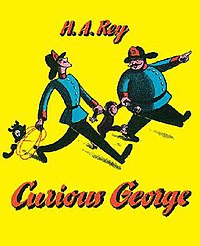Whenever I go into a library I feel bad that I cannot buy some of the books I find there - because I already own a copy.
That's a quote from one of the lectures that Jorge Luis Borges gave at Harvard University during the 1967/1968 academic year. (I have the 4-CD set of those lectures, This Craft of Verse.) It's a sentiment I share. It's avarice, I know, which is one of the seven deadly sins. However, my general financial situation over the last decade or so has kept my greed for books in check and I suppose that's a good thing.
Borges was an Argentinian poet, short story writer and internationally renowned speaker. He inherited a genetic trait for blindness from his father and by his 30s was nearly completely blind. Oddly, he never learned to read Braille, but had an incredible capacity for memory. In his late 60s, he gave his Harvard lectures without notes. In those lectures he quotes lines of poetry from memory in Spanish, English, German, Greek and Norse.
Here is Borges' poem Everness, translated from the Spanish by the great American poet Richard Wilbur:
Everness
One thing does not exist: Oblivion.
God saves the metal and he saves the dross,
And his prophetic memory guards from loss
The moons to come, and those of evenings gone.
Everything is: the shadows in the glass
Which, in between the day's two twilights, you
Have scattered by the thousands, or shall strew
Henceforward in the mirrors that you pass.
And everything is part of that diverse
Crystalline memory, the universe;
Whoever through its endless mazes wanders
Hears door on door click shut behind his stride,
And only from the sunset's farther side
Shall view at last the Archetypes and the Splendors.
Since we moved to Poland nearly two years ago, I have not had access to an English library. Books in English are rather expensive and so I've only been able to buy a couple of books. The plus to this is that I've been forced to re-read (for a third time in some cases) the books that I already possess. These books are nearly all classic literature, poetry, history, religion, biographies and such and are worth re-reading.
It's interesting that as I read many of these books a much older person than I was when I first read them, I get so much more out of them. I have to admit that in a few cases it's as if I had never even read them the first time. Apparently 15 - 20 years ago I plowed through some of these books and retained almost nothing from them.
As one who loves good books, I am gratified that my 7-year-old daughter Emilia loves to read. She's even memorized a classic Polish children's poem by Julian Tuwim - not because she had to, but because she loves the poem so much and read it so many times that she ended up learning it by heart. The poem's called Okulary (Glasses) and is about a man who loses his glasses, looks all over his house for them in a panic, only to see in a mirror that he's wearing them.
They have a pretty good children's library at their school and she often comes home with a small pile of new books to read. She seems to have inherited some of her Daddy's desire for books!
John the Baptizer
One June 24th, the Catholic Church celebrates the Nativity of Saint John the Baptist. Why the 24th of June? It's 6 months before Christmas, the birth of Jesus.
And behold, Elizabeth, your relative, has also conceived a son in her old age, and this is the sixth month for her who was called barren; for nothing will be impossible for God.
That's from Luke 1:36-37, from the Annunciation of the angel Gabriel to Mary.
All the Old Testament prophets foretold or pointed toward Jesus the Christ, in one way or another. John the Baptist was a forerunner of Christ and is considered the last in the line of Old Testament prophets; he's the bridge from the Old Testament to the New.
My favorite lines from John the Baptist are these: I am baptizing you with water, but one mightier than I is coming. I am not worthy to loosen the thongs of his sandals. (Luke 3:16) and He (Jesus) must increase: I must decrease. (John 3:30) Other favorite lines concern not what John said but what he did as an infant in his mother Elizabeth's womb: When Elizabeth heard Mary's greeting, the infant leaped in her womb. (Luke 1:41) and How does this happen to me, that the mother of my Lord should come to me? For at the moment the sound of your greeting reached my ears, the infant in my womb leaped for joy. (Luke 1:43-44)


No comments:
Post a Comment